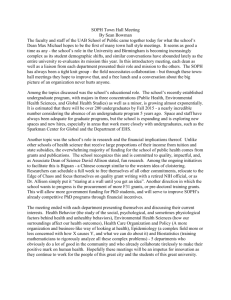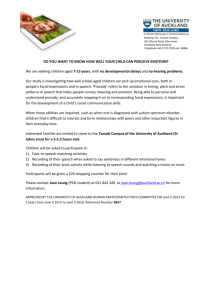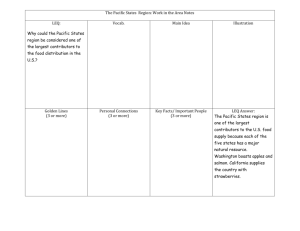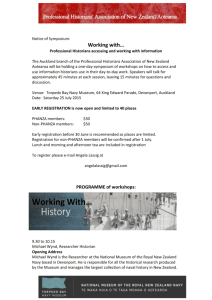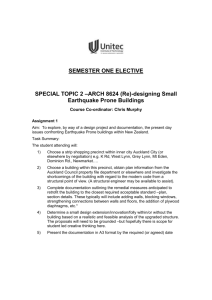June 2010 - Faculty of Medical and Health Sciences
advertisement
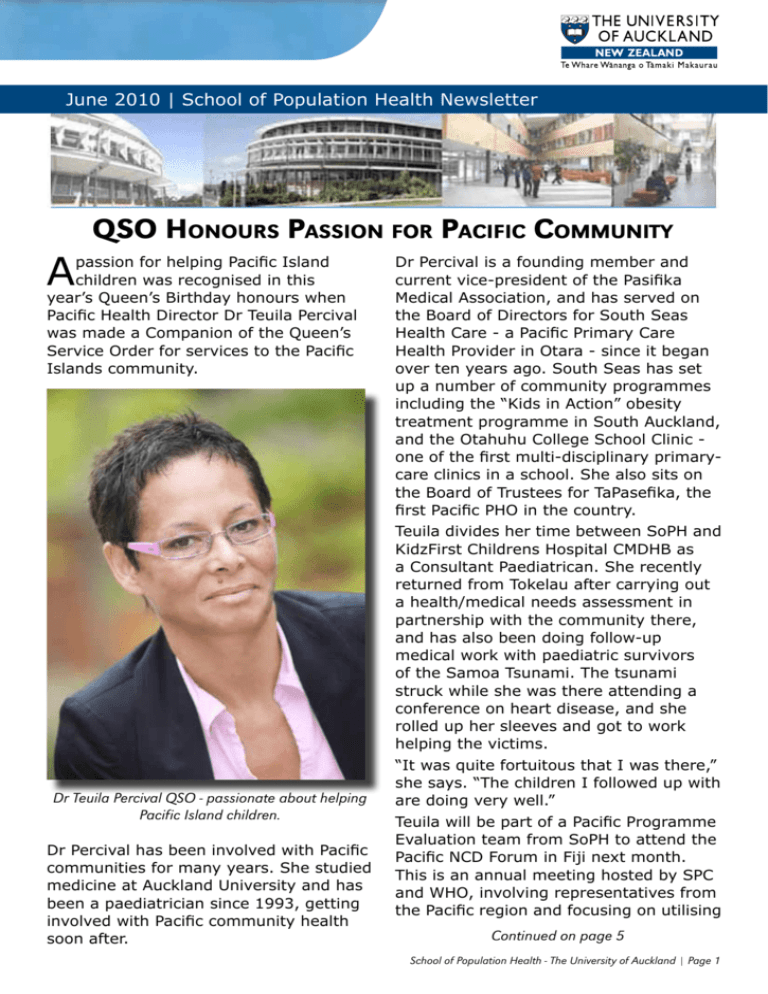
June 2010 | School of Population Health Newsletter QSO Honours Passion for Pacific Community A passion for helping Pacific Island children was recognised in this year’s Queen’s Birthday honours when Pacific Health Director Dr Teuila Percival was made a Companion of the Queen’s Service Order for services to the Pacific Islands community. Dr Teuila Percival QSO - passionate about helping Pacific Island children. Dr Percival has been involved with Pacific communities for many years. She studied medicine at Auckland University and has been a paediatrician since 1993, getting involved with Pacific community health soon after. Dr Percival is a founding member and current vice-president of the Pasifika Medical Association, and has served on the Board of Directors for South Seas Health Care - a Pacific Primary Care Health Provider in Otara - since it began over ten years ago. South Seas has set up a number of community programmes including the “Kids in Action” obesity treatment programme in South Auckland, and the Otahuhu College School Clinic one of the first multi-disciplinary primarycare clinics in a school. She also sits on the Board of Trustees for TaPasefika, the first Pacific PHO in the country. Teuila divides her time between SoPH and KidzFirst Childrens Hospital CMDHB as a Consultant Paediatrican. She recently returned from Tokelau after carrying out a health/medical needs assessment in partnership with the community there, and has also been doing follow-up medical work with paediatric survivors of the Samoa Tsunami. The tsunami struck while she was there attending a conference on heart disease, and she rolled up her sleeves and got to work helping the victims. “It was quite fortuitous that I was there,” she says. “The children I followed up with are doing very well.” Teuila will be part of a Pacific Programme Evaluation team from SoPH to attend the Pacific NCD Forum in Fiji next month. This is an annual meeting hosted by SPC and WHO, involving representatives from the Pacific region and focusing on utilising Continued on page 5 School of Population Health - The University of Auckland | Page 1 Lecture by World-Renowned Expert Attracts Wide Audience D r Jeffrey Wigand, former head of research at a US tobacco company, knows well what tricks the tobacco industry use. Dr Wigand blew the whistle on the tobacco industry in a now famous 60 Minutes interview fifteen years ago, revealing that tobacco companies deliberately manipulate the amount of nicotine in cigarettes. Josephine Samuelu (left), TAHA Well Pacific Mother and Infant Service, Stephanie Erick of Tala Pasifika and Nicola MacDonald of Mäori SIDS pose cheerfully with guest Dr Jeffrey Wigand after his lecture at SoPH. His lecture at SoPH this month, hosted by the school’s Centre for Tobacco Control Research (CTCR), attracted over 120 attendees from as far afield as Hamilton. This included representatives from ASH, CTCR, The Heart Foundation and The Cancer Society, as well as from CTRU, Pacific Health and Maori SIDS here at SoPH. Dr Wigand was a key witness in antitobacco litigation in the US, and is still vigorously campaigning against cigarettes, saying he thinks his efforts have made some difference in bringing the topic into the spotlight. He recently told the Herald “the mantra in the company I worked for was ‘hook ‘em young and hook ‘em for life’.” Dr Wigand is visiting New Zealand at the invitation of ASH, to share expert testimony with the Māori affairs select committee. Page 2 | School of Population Health - The University of Auckland Update on SoPH Review T he School Self-Review Portfolio has been completed, consisting of a self-review document, a volume of appendices, and a CD with further background material. Putting this together was hard work, but I believe the Portfolio will be very useful, not just for the Review, but in planning activities in the School in the next few years. The Portfolio brings together in one document a full description of our teaching, research, service activities, financial position, and management and operations. It will be a wonderful resource. I would like to thank everyone who contributed, but especially Evie Kinane and Theresa Nathan (our temp). They combined multiple drafts, formatted, helped with editing, and printed endless copies for proof-reading and correction. This is not a public document, but I am keen that everyone in the School has an opportunity to see the Portfolio, and has an opportunity to read it if they wish before the review team visits. Copies will be distributed, and the Administrators in each Section will be responsible for making arrangements for people to borrow and read them. This is a little cumbersome, I acknowledge, but at this stage in the Review we cannot distribute electronic copies. I am meeting the Chair of the Panel next week to discuss arrangements for the Panel’s visit, and will send another update around the School when I know more about the programme. If you have any queries about the Review, or the Portfolio, please don’t hesitate to speak to me or email. Alistair Woodward, Head of School Atrium a Gallery for CertHSc Annual Photo Essay J une saw the Atrium host a display of the CertHSc student’s work for their Photo Essay assignment. The Photo Essay assignment is a creative piece of work which required each student to address the topic of ‘Health is ...’ via the use of photography. A written component of this assignment Sue Kistanna, new General Manager for Te Kupenga Hauora Māori, admires the photo essays. is incorporated via the provision of a bibliography and synopsis on the photos presented. What it is: • A photo essay is a collection of photos around a common theme. • It includes photo captions and in our case a synopsis and biography of the photographer. Continued on page 5 CertHSc student Ofa Vaipulu (above) chooses her vote for the prizes for best photo essay, best photos, and best concept. CertHSc student Alexandrea Pita (below), winner of the “Best Photo Essay” prize, demonstrates her winning technique. Purpose: • To extend the subject of communication to a medium that is a mixture of written and visual. This is in effect very similar to journalism and the formation of public opinion, which are conveyed through the pictures on cigarette boxes, billboards, advertisement etc. • To allow students to explore their interpretation of the theme ‘Health is ...’ through an analytical tool. • To enable students to express themselves and their writing through a different medium. School of Population Health - The University of Auckland | Page 3 W 2010 Careers Day a Showcase for SoPH and CertHSc ith record numbers in attendance at this year’s Māori and Pacific Health Careers Day, secondary students across Auckland are motivated to become health professionals. combined with 61 CertHSc students, and were treated to an integrated programme offering an inspirational session with Māori sporting icon Tāwera Nikau, a two-hour health expo, health/science workshops and an “interactive health quiz” using the new clicker technology. Showcasing the CertHSc programme was an important aspect to the open day. The aim of High-school students, CertHSc students and SoPH staff mingle during the 2010 Mäori and Pacific Health Careers Day in May. While the day was organised and run by Te Kupenga Hauora Māori and the Vision 20:20 programmes, over thirty health providers and numerous FMHS departments also manned stalls to promote different health professions. The full day programme aimed at showcasing what the SOPH offers in health. Over 150 students attended Page 4 | School of Population Health - The University of Auckland the CertHSc is to bridge the gap between secondary school studies and university. The one-year course has been running since 1999 with 61 students enrolled Continued on page 5 Continued from page 4. in 2010. The CertHSc course covers physics, chemistry, biology, population health, mathematics and Māori and Pacific Health. Kaiārahi/Academic Director of CertHSc Dr Elana Curtis said this extra learning in science-related topics was an important precursor for courses offered by the Faculty of Medical and Health Sciences, such as Medicine, Nursing, Pharmacy and Health Sciences. Dr Curtis said she was keen to encourage more Māori to enter the programme and the open day given the significant inequities in educational outcomes for Māori students leaving high schools in New Zealand. Having the opportunity to bridge into health programmes via the CertHSc is a key component of the Faculty’s commitment to achieving equity in health via workforce development. Continued from page 1. evidence to implement proven strategies and encourage people to change lifestyle habits to stop chronic diseases. The SoPH team will be presenting a workshop on programme evaluation, and will also host a breakfast for funders to present the work and experience of the SOPH in relation to NCDs. “The team going is myself, Amanda Dunlop, Janet Clinton, Jude McCool and Chris Bullen”, says Teuila. “We see this as an important opportunity to share the capability and experience of the SOPH and also, as is so important in the Pacific, to meet people from the different countries and funding organisations in person.” Future work includes a new project funded by Ausaid to develop clinically functional child health indicators for the Pacific in Samoa and Tonga. “This is significant recognition of Teuila’s work,” said Alistair Woodward. “It is wonderful to see her efforts acknowledged in this way.” Congratulations to Teuila for her award, and best wishes for her future work. Continued from page 3. Final works were presented in a CertHSc Photo Essay exhibition in Week 12. Careers Day attendees take a time-out in the atrium between programmes. The Māori and Pacific Health Careers day was fully supported by TKHM funding in 2010. Many thanks are due to organisers Abigail Pye, Marie-Chanel Berghan and Robert Loto, and to the many CertHSc, WAP and MAPAS staff that make up the Vision 20:20 team (and who also provided the excellent pictures - thanks team!) The CertHSc assignment had 4 different prizes. The best technical photo was judged by expert photographer Vicky Te Puni. Other prize categories were decided by fellow student cohort themselves. The winners were: • Yandall Tuigamala: Best Theme • Wilhem Killip: Best photos • Aleshia Amos: Best technical photo • Alexandrea Pita: Best overall Congratulations to students and staff alike for creating an entertaining and thought-provoking display. School of Population Health - The University of Auckland | Page 5 Fourth Asian Health Conference Welcome to New Manager he Centre for Asian Health Research and Evaluation (CAHRE) is hosting the 4th International Asian Health and Wellbeing Conference on 5th and 6th July 2010 at the School of Population Health (SoPH). The theme of the conference is An Holistic Approach to Asian Health, a theme that reflects the multiculturalism in New Zealand. enise Greenwood joined the School as the Research Development Manager, a new role with a very strong development focus. The intention is to support new initiatives in the School, to ensure we make the most of the rich mix of skills and experience amongst our staff and students, that we gain the funds needed to do this work, and that good research leads to good research outputs. Since joining the School three months ago Denise has been involved in preparations for the School Review, meeting researchers and advising on funding opportunities. T Don’t miss out on the opportunity to meet with the keynote speakers: • Prof Leighton Ku, Director, Center for Health Policy Research, George Washington University (USA) • Prof Kamlesh Khunti, Co-director, South East Midlands Diabetes Research Network, University of Leicester (UK) • Assoc Prof Sukanya Ray, Asian Mental Health Clinic, Suffolk University (USA) • Assoc Prof Samson Tse, Director, Master of Social Sciences, Universit of Hong Kong (HK) Featured Speakers include Prof Shanthi Ameratunga, Dr Fiona Rossen, Assoc Prof Elsie Ho and Dr Amritha Sobrun-Maharaj, from SoPH. The conference will cover such topics as: • Diabetes in South Asians: Nature, Nurture or Karma? • Understanding health risks, healthcare needs, and challenges of Asian immigrants: Bridging the gap through research, service, and training • The promise of health policy for Asians: the United States experience • Keys to foster and improve Asian migrants’ health: a personal reflection For more information, please feel free to contact Mr Sun Kim, cahre@ auckland.ac.nz or visit our website: http://www.fmhs.auckland.ac.nz/ asianhealthconference. Page 6 | School of Population Health - The University of Auckland D D New PhD Wins Award r Bridget Kool from the Section of Epidemiology and Biostatistics has been awarded an Auckland Medical Research Foundation Postdoctoral Fellowship. The award provides two years’ support for a science or medical graduate who has recently completed a degree at doctorate level and who proposes to pursue a career in medical research. Bridget will use the support to explore the development of a computerised decision support system (CDSS) to assist health professionals to more accurately diagnosis, and more effectively manage children (0-14 years) who present to the emergency department with mild traumatic brain injury. Congratulations Bridget. C HRC Successes for School ongratulations to researchers from the School of Population Health who were successful in this year’s HRC annual funding round. The $14.4 million awarded to researchers in the School of Population Health will fund two programmes, five research projects and one feasibility study. In this recent HRC funding round University of Auckland researchers were awarded 19 grants worth a total of $23.9 million. In addition congratulations go to a number of HRC successes associated with collaborative research involving researchers from the School with members of other institutes including Faculty of Science, AUT and District Health Boards. The successful applicants from SoPH are: • Robert Scragg – New Programme: Effect of vitamin D on cardiovascular and respiratory disease event rates • Cliona Ni Mhurchu – Programme extension: Population interventions to improve nutrition and physical activity • Shanthi Ameratunga – Project: Determinants of life-threatening injuries among young and middle aged adults • Ngaire Kerse – Project: Live and Living in advanced age: a Cohort study in New Zealand • Ralph Maddison – Project: Efficacy of an m-health based cardiac rehabilitation programme • Natalie Walker – Project: Cytisine – a promising low cost intervention for smoking cessation • Diana Lennon – Feasibility Study: Can we reduce Māori and Pacific School children’s Hospitalisations to Pakeha Rates? • Chris Bullen - Project: Trial of e-cigarettes for smoking cessation. Congratulations to all. I TKHM Wins ICIHRP Funding n March this year HRC announced funding for 3 new projects through the International Collaborative Indigenous Health Research Partnership (ICIHRP) scheme, a partnership involving New Zealand, Australia and Canada in research focused on improving the health of indigenous populations. Two of the three projects are headed by staff in Te Kupenga Hauora Māori. Sue Crengle was awarded funding for 3 years to lead a project on strengthening health literacy among people living with cardiovascular disease. The project aims to improve information accessibility and understanding by patients and families affected by CVD through advancing knowledge and skills development of health care providers. Rhys Jones is lead investigator on the project “Educating for Equity”. This study will explore how education of health professionals can reduce disparities in care and improve chronic disease outcomes for indigenous populations. Congratulations to Sue and Rhys and their teams for winning these highly competitive research awards. D Māori Health Week in July uring the second week of July SoPH is expecting a record number of students for Māori Health Week. With over 400 attendees expected, all rooms on campus have been booked. School Manager Peggy McQuinn says to expect some activity from Tuesday to Thursday (13th to 15th.) Wrap up and end of week presentations will be held in the atrium on the last day. “These activities are an important opportunity to showcase the School,” says Peggy. School of Population Health - The University of Auckland | Page 7 Population Health Intensive Week Engages Students for Forth Year A week focussing on population health for Year 5 medical students, Population Health Intensive, ran for its fourth year from May 10-14 at the School. to mitigate the health effects on people from a small island nation of being moved as ‘eco-refugees’ to New Zealand, due to rising sea levels inundating their country. Keynote speaker Dr Kumanan Programme convenor Associate Professor Rasanathan set the tone for the week Chris Bullen said that the standard of with a talk on ‘Why 21st century clinicians need to have a population health perspective.’ Dr Rasanathan is a public health physician currently working with the WHO, Geneva in the Department of Health Equity and Trade. An Auckland graduate, he captivated the audience with an account of his journey as a doctor to his current role, and argued that fairness is central to a Keynote speaker Dr Kumanan Rasanathan, a public health physician doctor’s work. currently working with WHO, captivating the audience of year 5 medical students during Population Health Intensive week. His talk set the tone for the week, in which 180 student work was very high overall. students in teams of 10 developed a “Students really engaged as teams with costed proposal for a population health their topics, were innovative and wellintervention to tackle one of 18 topics informed, and were ably supported by ranging from elder abuse, housing and energetic facilitators from the School. ” neighbourhoods to climate change. said Chris. To work on their ideas, students visited community agencies and reviewed literature, culminating in presentations to the other teams on Friday including a video-conferencing link to the two Pukawakawa student groups in Northland. The team assessed as having the best presentation came up with a proposal Page 8 | School of Population Health - The University of Auckland C ontributions to the School of Population Health newsletter can be sent to John Trevithick at j.trevithick@auckland.ac.nz. The SOPH news is a quarterly publication. The next issue will be published in September.

